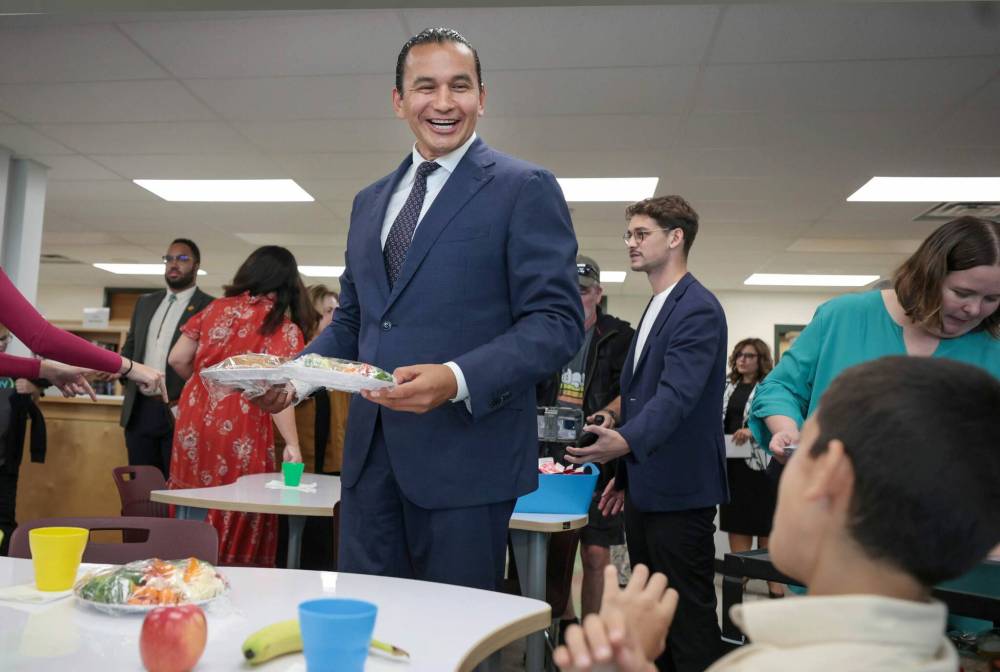Manitoba schools are undergoing kitchen renovations, hiring food co-ordinators and stocking up pantries as they roll out expanded meal programs.
Premier Wab Kinew and Education Minister Nello Altomare shared lunch with elementary students at Donwood School on Thursday to celebrate the launch of the NDP government’s “universally accessible” nutrition program.
Turkey-and-cheese sandwiches, bowls of fruit and cartons of two per cent milk were on the menu for the media event.
“The toughest part of being a parent, practically, is getting the kids ready for school in the morning, including packing a lunch. Governments can’t do everything — that’s going to continue to be a challenge for many parents out there,” Kinew told a crowd in the Rossmere school’s library.

Ruth Bonneville / Free Press
Manitoba Premier Wab Kinew and Education Minister Nello Altomare were on hand to launch the school nutrition program at Donwood School, Thursday.
The expansion will feed students who show up to school hungry and thereby limit disruptive behaviour in classrooms, he said.
The province earmarked $30 million in this year’s budget to make healthy meals more widely available to students across the public school system.
The federal government is anticipated to provide about $3 million extra as part of a national initiative. Altomare said the arrival of those funds is “imminent” and details about how they will be spent are forthcoming.
So far, the River East Transcona School Division has been allocated $1.3 million in public money to expand breakfast, lunch and snack offerings for the 2024-25 school year.
Superintendent Sandra Herbst said students enrolled at Donwood and 41 other schools in the area have “more access to more food more often.”
“This is going to allow us to really scale and feed all the kids that are hungry.”–Jennifer Scott, principal of Hugh John Macdonald School
Public school divisions are receiving a total of about $21 million, $6 million of which was set aside for 50 schools in areas with “high socio-economic need.” The remaining grants are being distributed on an application basis.
“This is huge for us. Huge,” Jennifer Scott, principal of Hugh John Macdonald School, said. “This is going to allow us to really scale and feed all the kids that are hungry.”
The cafeteria inside the Grade 7 to 9 building is under construction to expand its kitchen and the number of free meals available to students.
On a typical school day in years past, 40 to 50 students have bought a discounted lunch on site, Scott said. Hot meals were previously sold for $3 each.
The inner-city principal said new funding will ensure the lunch program can triple in size.
The school plans to feed “at least” 150 students lunch this year in addition to running its longtime breakfast program, Scott said.
Altomare told reporters he expects each of Manitoba’s roughly 700 public schools to have nutrition programs in place as the academic year gets underway.
The upgrades vary from school to school, with some purchasing commercial-grade appliances to ensure they can properly refrigerate perishables and wash dishes in a timely manner, he said.
The province has requested schools spend about 65 per cent of the new money on food and beverages and the remaining funds on additional staffing and equipment.
“Growing pains” are all but certain as schools upscale programming, especially given how much time it takes to plan and prepare meals, said Clara Birnie, community dietitian and program grants manager at the Child Nutrition Council of Manitoba.

Ruth Bonneville / Free Press
Premier Wab Kinew hands out free lunches to students after the announcement at Donwood School.
Birnie’s advice to school staff members is to prioritize a variety of ingredients to expand students’ palates.
“That’s going to help them with biological nutrition but also their relationship with food and their eating habits,” she said, adding she’s excited to see how programs change this year.
School meal planning is informed by provincial nutrition guidelines that tout lots of fruits and vegetables, whole-grain products and proteins that are limited in high-saturated fats.
Birnie said the expansion of school nutrition programs is a good time to update the guidelines, which were released in 2015.
The nutrition council — one of several charities continuing to fund a patchwork of school meal programs — is supporting 422 initiatives on about 400 sites this year. That’s an increase from 403 programs in 2023-24.
The province has nearly doubled the organization’s annual funding, now just short of $5 million, since September 2023.
maggie.macintosh@freepress.mb.ca

Maggie Macintosh
Education reporter
Maggie Macintosh reports on education for the Free Press. Originally from Hamilton, Ont., Maggie was an intern at the Free Press twice while earning her degree at Ryerson’s School of Journalism (now Toronto Metropolitan University) before joining the newsroom as a reporter in 2019. Read more about Maggie.
Funding for the Free Press education reporter comes from the Government of Canada through the Local Journalism Initiative.
Every piece of reporting Maggie produces is reviewed by an editing team before it is posted online or published in print — part of the Free Press‘s tradition, since 1872, of producing reliable independent journalism. Read more about Free Press’s history and mandate, and learn how our newsroom operates.
Our newsroom depends on a growing audience of readers to power our journalism. If you are not a paid reader, please consider becoming a subscriber.
Our newsroom depends on its audience of readers to power our journalism. Thank you for your support.